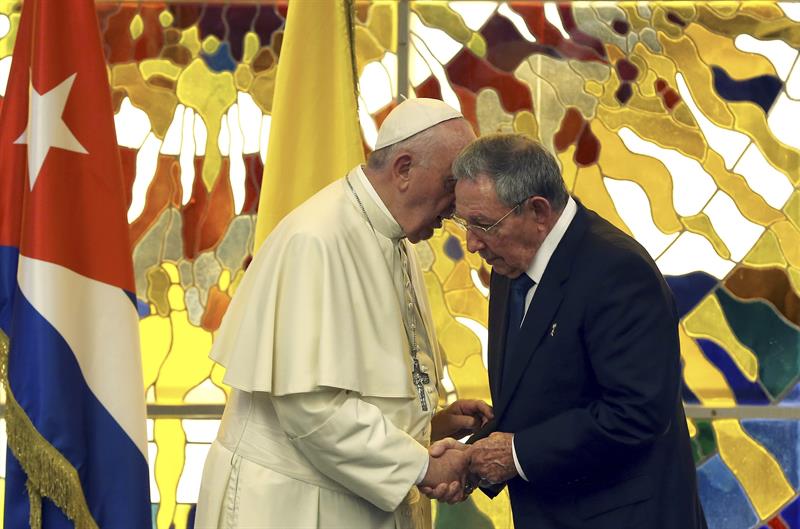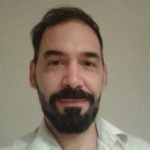Photo: EFE
The route undertaken by Bergoglio in North America is not fortuitous.
The several-day visit to Cuba, which includes a historic encounter with the Cuban leader Fidel Castro, seeks to reap the benefits of Vatican diplomatic efforts that led to the opening of relations between the island and the United States. “If the Pope continues like this, I will start praying again and going to the Church,” said Raul Castro after his meeting with the Pope at the Vatican a few months ago. However, on this tour Bergoglio is looking for more than the return of the younger Castro to the church. The Vatican also wants to confirm that it is a reliable mediator in the relationship between Cuba and the United States. Furthermore, the Secretary of the “Holy See” State says that it is “desirable…. to have [further]liberalization, especially in economic terms.” The announcement on Friday, September 18 by the US government, of new and more flexible measures of trade, travel, and investment and abating the embargo against Cuba, arrived at the right time. Another gesture toward the Castro bureaucracy is the confirmation that Francisco will not meet with dissident groups in Cuba.
These gestures toward the government and his understanding that the Cuban’s demand to lift the embargo is not without conditions, make it clear that the Pope seeks to achieve a greater role for the Cuban church within the pro-capitalist transitional reforms promoted by the Castro bureaucracy .
Bergoglio, who closely followed the visit of John Paul II to the island (and even wrote the brochure, Dialogues between John Paul II and Fidel Castro), seems to want to finish the work of the previous Pope. In January 1998, during the period where Cuba was coming out of the worst of the economic crisis and after the collapse of the Soviet Union, Cuba received a visit from John Paul II who asked for “Cuba to open to the world and the world to open to Cuba,” as he called for political and social reform. This openness to the Church’s involvement in Cuban public life was stopped by the constitutional reform of 2002, which decreed “irrevocable socialism” and the persecution of opponents of the Black Spring of 2003 .
The second half of the tour will take Bergoglio to the heart of the empire. In five days he will visit three cities in the United States, culminating in Philadelphia. His main purpose is to establish positions at the World Meeting of Families, calling on priests to “forgive” those who promote abortion or marriage annulment. The goal is to regain ground that has been lost by maintaining the misogynist and patriarchal Church.
Before the meeting in Philadelphia, the Pope will meet with President Barack Obama, where he will also deliver a historic speech to Congress- the first time a pope will speak in this institution. The Pope will also give another speech at the United Nations. It is clear that the Vatican’s claim for a “fairer system” and a more humanized capitalism, will continue to be part of the speeches. It is also expected that Bergoglio will emphasize the immigration issue in the United States, which has upset the Republican Party, accusing the pope’s tour of attempting to strengthen the Obama administration. It is undeniable that the Vatican diplomacy has the clear intention of strengthening the Obama administration, because the pressure on the opening of Cuba helps Washington justify its agreements with Castro.
Certainly, in an attempt to consolidate Vatican’s the important role in international politics, one of Bergoglio’s most important goals is to recover the authority of the Catholic Church in the United States. A recent study by Pew Research shows that the number of Catholics in the US has dropped from 24% in 2007 to 20% in 2015. The cases of abuse and pedophilia by Catholic priests were some of the main reasons for this drop. It is clear that Bergoglio seeks to display a “humanized” face in his speeches. The choice of discussing immigration and racial issues in his speeches is not a coincidence.
From his famous statement, “Hagan lío” (cause trouble) in Brazil and throughout his Latin American tour, Bergoglio has sought to play an active political role and has been a key player in the “thaw” between United States and Cuba. The upcoming tour in these countries seeks to consolidate the role of the Church as an intermediary in the process of capitalist restoration in the island and restoration of diplomatic relations. The pope’s statements have one goal: to rebuild the authority of the Catholic institution (hit by corruption and abuse) in a scenario of social and economic crisis, and emerging as a useful mediator in the face of societal questioning of the ruling class as a caste that governs for the powerful.











